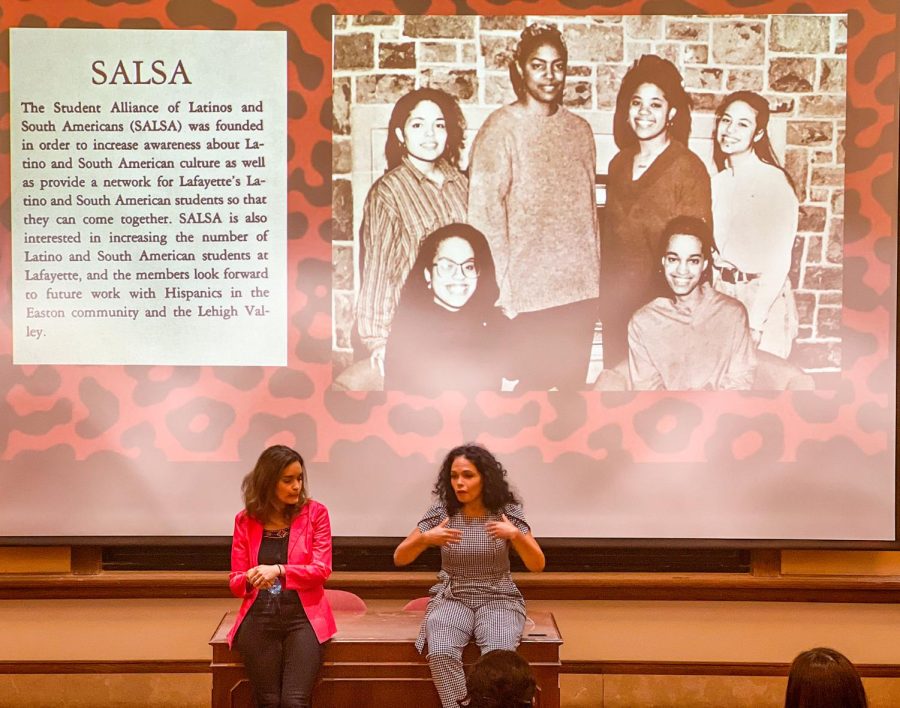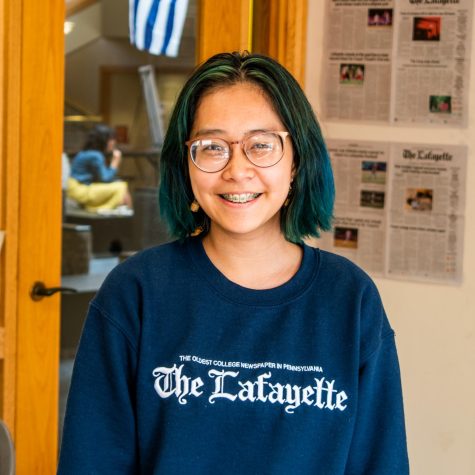When Gina Arias ’93 and Tinabeth Piña ’93 were students at Lafayette, Latinx Heritage Month wasn’t even celebrated on campus. Thirty years later, they returned to campus as keynote speakers for the month.
This past Tuesday, Arias and Piña spoke at the Latinx Heritage Month keynote event presented by the Office of Intercultural Development.
Piña is an Emmy-winning multimedia journalist who has worked on air and behind the scenes for television networks including ABC, FOX, PBS, A&E, The History Channel and Oxygen. She is the creator, executive producer and host of “LATiNAS,” a magazine show celebrating the women of the Latinx community. She is also the creator, executive producer and host of the recently Emmy-nominated “Globe Scholars,” which documents students as they study abroad.
Currently, Piña works as the managing director at CUNY TV, the City University of New York’s Emmy award-winning television station.
During her time at Lafayette, Piña was one of two recipients of the 1993 Pepper Prize, the first time two seniors have ever tied for the award. Earning a degree in Spanish and American Studies, she was the first student in Lafayette history to graduate with separate honors for both her majors. She was a DJ at the college and launched the first bilingual radio show in the Lehigh Valley, featuring a variety of Latin music.
Arias graduated from Lafayette with a degree in international affairs. She then went on to serve in the Peace Corps in Niger conducting health and nutrition education. This led her down the path of public health work. She has worked for various nonprofit advocacy and service organizations, as well as the New York City Department of Health.
She currently works with the Maternal Justice Team at MomsRising to advocate for policy changes and greater resources for maternal mental health. Additionally, she is the co-creator of the podcast “Excursions with Gina Arias” and the senior editor of “Detour,” a publication aiming to tell the best stories in Black travel.
At Lafayette, Arias co-founded the South American and Latino Students Association, or SALSA. According to Arias, this organization was a precursor of sorts to the Hispanic Society of Lafayette (HSL). She was also the cultural co-chair for the Association of Black Collegians.
After opening remarks from associate director of Intercultural Development Karina Fuentes and HSL president Eduardo Andrade ‘23 and co-vice president Shirel Salinas ‘24, Arias kicked off the keynote event by emphasizing the importance of confronting anti-Blackness within the Latinx community.
“We get these messages that whiteness is more beautiful and more valuable or worthy of praise … I honestly think if there’s any generation that’s going to stop it, it’s yours,” Arias said.
During her time at Lafayette, Arias worked with the Easton community in many ways, including participating in marches protesting the case of Rodney King. She encouraged current Lafayette students to do the same.
“Here on campus and in the city, the beautiful city of Easton, you can and should connect with other people who are trying to change our society,” Arias said.
Afterward, Piña spoke about her experiences of being underestimated and “put in a box” in her childhood and at Lafayette. When she was working at the dean’s office, she discovered that Lafayette labeled her as an “at-risk student” for five reasons: she was a commuter, she had low SAT scores, she was an athlete, she was a woman and she was Latina.
“I understand why they did that. They were looking out for my best interest,” Piña said of being labeled as at-risk. “But … they didn’t know me. They didn’t know what I was capable of.”
According to Piña, the anger she felt from being underestimated motivated her throughout her career.
“I created a show called ‘LATiNAS,’ for, by and about Latinas … That all started here, because I was challenged to be more than what people thought I was, what I was not,” she said.
Piña encouraged everyone to take the traits that society labels as disadvantages and view them in an empowering light.
“I’m Latina. That’s my superpower. I was an athlete. That was my superpower. I didn’t have the best SAT scores. That was my superpower,” she said. “All the negative things, they were all my superpowers.”
“You can aim for the moon, but at least you’ll reach the stars,” Piña said at the end of the talk. “So up, up and away, mi gente.”























































































































